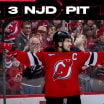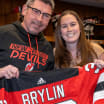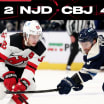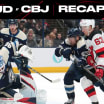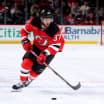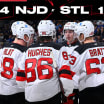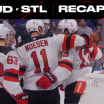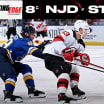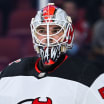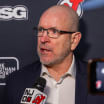As the Devils regrouped for Game 7 of their now melodramatic series with the Rangers, the New Jersey-New York Metropolitan Area had become Hockey Country.
The Yankees and Mets were being pushed aside as tabloids, broadsheets and every manner of electronic media descended on Madison Square Garden enhancing the pre-game hysteria.
While it was only natural to focus on the decisive match to be held, many in the journalistic mob waxed poetic over Game 6.
They recounted how well the Devils played; just one period away from a colossal upset. Stories abounded about Mark Messier's "guarantee" of a victory and how the Blueshirts counterattacked to victory in the third period.
"This has been a great series," said former NHL coach and now ESPN broadcaster Barry Melrose, "with a lot of special plays and special players."
The Start of the Greatest Game | SUNDAYS WITH STAN
The Devils and Rangers clashed in Game 7 of the 1994 conference finals in the greatest game and greatest series in NHL history
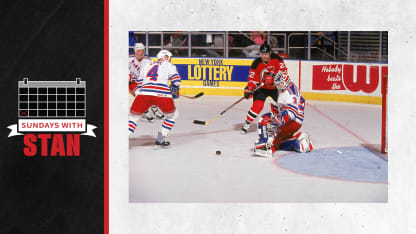
sundays with stan
DEVILS-RANGERS, 1994 EASTERN FINAL
Part 8: 'One Hell of a Third Period'
Part 7: Happy Half of Game 6
Part 6: Prelude to Game 6 Melodrama
Part 5: The Devils' Offensive
Part 4: Ultra Suspenseful Game 3
Part 3: Can the Devils Do It Again!?
Part 2: Devils Upset Rangers in Game 1
Part 1: Prelude to the Historic Series
Devils coach Jacques Lemaire and his aide de campLarry Robinson knew that they had to re-invigorate their troops. Nor would it be easy. But they had been through the playing wars together on the Montreal Canadiens. They knew what had to be done.
"It's still a best-of-seven series," chirped Lemaire, "and we have three wins. So, do they. Which means we're both alive and read to go."
On the Rangers side, coach Mike Keenan also had his collection of Cup-winners. Because so many of them had skated for champion Oilers teams, they were nicknamed the Edmonton Rangers.
"They can call us whatever they want," said Rangers defenseman Kevin Lowe, a former Oiler. "The point is that the series isn't over yet. We still have to win another game."
An off-day intervened between Games 6 and 7. There was plenty of time to go to the various drawing boards and meet the press. The adjective machine was running overtime.
One of the busiest journalists was former Devils forward Peter McNab, now a television analyst. "This seventh game," stated McNab, "will be as good as it will ever get."
Not surprisingly, the Messier madness had a good portion of public opinion believing that a Rangers' Game 7 victory was in the bag.
Jacques Lemaire disagreed. Author Tim Sullivan (The Battle On The Hudson) was chronicling the coach's every move if not his lines of thinking.
Sullivan: "Jacques wasn't about to let his team lose the opportunity of a lifetime. They were still only three periods away from an Eastern Conference crown. This well-used phrase rang true:
"'At the beginning of the season if you were to tell me that we'd have a chance at the Finals in a Game 7 setting, we would have taken it any time.'"
The Devils' theme held up throughout: Accent-U-Ate-The Positive. Eliminate The Negative, Latch Onto the Affirmative and Don't Mess With Mister In Between.
One way to win would be for Marty Brodeur to pitch a shutout and everybody knew that that would be asking a bit much.
All hands agreed that this would be the game in which everyone would give a total effort. Each Devil privately had his thought process in motion.
Bill Guerin: "I was in my third year as a professional with the Devils. It was neat for me to see our team's progression as we got better and better by the season. Now we were in an advanced position."
Tom Chorske: "I got to New Jersey in 1991, and those were a rough couple of years. We weren't horrible, but we weren't a contender. So, to see how far we had come in three years was pretty special.
"For me, it just felt good to have contributed and to have been part of the process. My teammates and I had paid our dues along the way and now were at the highest rung on the ladder up to this point."
Even though it was early morning on Friday, May 27, 1994, crowds had begun to gather on Seventh Avenue between West 31st and West 33rd Streets in front of The Garden.
Others strode along the sidewalks on 33rd Street between Seventh and Eighth Avenues, hoping to find a ticket for this game-of-all-games. One of the onlookers happened to be ESPN play-by-play analyst Gary Thorne.
Nobody had to tell this veteran sportscaster about the game's significance.
Thorne: "This is the stuff of which sports history is made - for Mark Messier and the Rangers; if indeed this is to be their year. It's the kind of thing that makes you believe that destiny is really there on your bench."
Meanwhile, the Devils were hoping that someone else was on their bench.
Lady Luck!
…
Some call it the greatest game in the greatest Stanley Cup playoff series.
Author Tim Sullivan certainly did. What's more he wrote an entire book about it, "Battle On The Hudson."
Lou Lamoriello did not agree that it was the greatest series. And for good reason; his team lost but only after one of the most glorious ice battles in National Hockey League annals.
Then again, Lou did certify that it was tremendously exciting hockey, from Game 1 to Game 7. And the finale was the most heart-throbbing of all.
It happened on May 27, 1994 at The World's Most Famous Arena, Madison Square Garden.
"That series was as good as it gets," said Sam Rosen, the Rangers play-by-play man for MSG Networks. "And Game 7 was the best of all seen of them."
Even though the Blueshirts had won Game 6 in the most thrilling manner imaginable, the Rangers camp overflowed with respect for the New Jersey skaters. Game 7 was up for grabs; that was for sure.
"The Rangers knew that the Devils were a team on the rise," Rosen added. "I saw New Jersey as having a team that was right there with the Rangers. Equal."
Perhaps as interesting as anything about this climactic scene was that veteran journalists and broadcasters - dispassionate as they like to be - lost it this time around. Rosen was one of the first to admit it.
Rosen: "It was a Friday night at The Garden and it was as tense and nerve-wracking as any experience I ever had. Playoffs at The Garden were always so special. In fact, the building felt like it was vibrating. It was electric."
Sam's counterpoint on the Devils side was Mike Miller. Like Rosen, Miller admitted that he was experiencing a once-in-a-lifetime feeling. Likewise, he was doing his job, looking for angles to the climactic saga.
"It was Game 7," Miller remembered, "and I was thinking questions and one of them was about the coaching. How was Jacques Lemaire and his team going to be able to prop themselves up for another chance at it?
Just before the opening face-off, that's what I was thinking about."
Then a Daily News beat writer, current MSG Network's John Giannone was all wrapped up in the raucous scene. In Matthew Blittner's book, "Unforgettable Rangers," Giannone recalled the aura of madness.
"Getting into the game," said Giannone, "I remember the National Anthem being sung by John Amirante, and you couldn't even hear him singing; that's how loud the building was.
"Even before the Rangers even took the ice for their skate a half hour before the game, the buzz was like nothing I ever heard before. The decibel level rose to a different place it had ever been before."
ESPN's veteran broadcaster Gary Thorne described the sound another way. "The most famous sports arena just had its roof taken off with the National Anthem."
Now it was Mark Messier vs. Bobby Carpenter for the opening face-off. The Devils center won the rubber and Game 7 officially was underway and the Devils looked fresh and good.
"No question," reported Mike Miller, "the Devils have come to play. They are out to set a tone."
So, were the Rangers.
If it had been a World Series game it would have been called a "pitcher's battle. Now it was goaltenders - Mike Richter vs. Martin Brodeur for all the marbles.
In the Rangers radio broadcast booth, Howie Rose described his emotions as "jacked." He expanded on his feelings, working with his sidekick analyst, Sal Messina.
"We didn't need any external sources to get motivated to a fever pitch. It was right there before us. The only challenge I had was to keep my emotions in check.
"I knew that, from time to time, I would get carried away. I didn't want to sound like a fan and go over the top. I hoped that my professionalism would take over."
As in Game 6, the Devils pressed the offensive early. Stephane Richer was the first New Jersey player to test Richter who made the save. At the start, at least, Messier was held in check and lost his first three face-offs.
But it didn't take long for the Blueshirts to ride the wave of roars from their Faithful. Within five minutes they had fired six shots at Brodeur and began outhitting the Visitors as well.
Claude Lemieux was pancaked by the normally non-belligerent Brian Leetch while Kevin Lowe hit Bernie Nicholls so hard the rubbery center nearly fell into the Devils' bench.
It was an ironic twist whereby the Rangers were playing Devils gritty, physical hockey while the Devils put the accent on skill and skating. In other words, the vice was versa.
Preparing for his book, "Battle of the Hudson," Tim Sullivan interviewed Brian Leetch who was to become a chief protagonist in the final game.
Leetch: "The benefit of us winning the sixth game was getting the Devils to play on their heels just a little bit there early on. That allowed us some breathing room without having to force the play.
"There were opportunities both ways even though both teams were playing close to the vest. But we liked the flow of the game and we were getting chances. Marty (Brodeur) was playing well for them, though, and we knew it was going to be just one of those games."
The Devils push-back gained force late in the first period. Esa Tikkanen was wallpapered along the boards by New Jersey's Bruce Driver. After hitting the ice Tik headed for the dressing room for stitches in the forehead.
Broadcasting for ESPN, former Philadelphia Flyers forward Bill Clement summed up the frenetic first period in a manner that captured the feel of this monumental game.
"I don't care who you are," Clement enthused, "If you're watching this, you have to like it."
Like it, both teams did as the first period buzzer sounded throughout The Garden. After all, neither team was losing!
The scoreboard told the story in this most passionate of settings. It was nothing-nothing after one; and anybody's hockey game.
A press box regular added his words of wisdom: "First goal wins!"
He was almost right.




